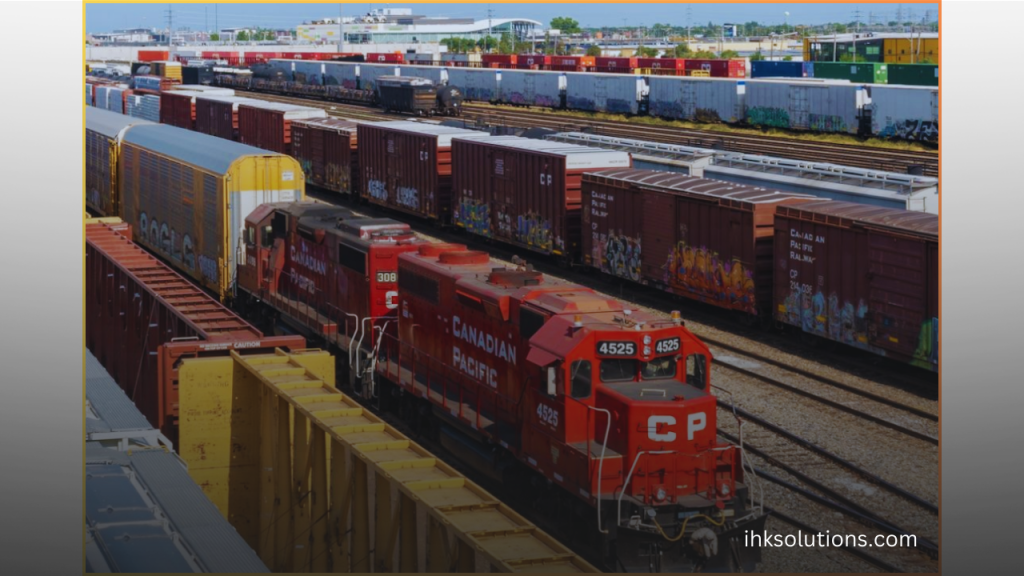Railways Resuming Full Service After Binding Arbitration by the Labor Board

Railways Resuming Full Service After Binding Arbitration by the Labor Board
Canadian railways are resuming full service after the Labor Board imposed binding arbitration and ordered thousands of railway workers to return to work, ending a dispute that had crippled the country’s supply chains.
The Canadian National Railway Company announced that it has restarted operations since workers returned to their duties on Friday morning, but a company spokesperson noted that it could take more “about a week to get back to full service.”
Meanwhile, Canadian Pacific Kansas City Ltd. (CPKC) urged its employees to return to day shifts on Sunday, but the Teamsters union stated that its members at the company would not resume work until one minute past midnight on Monday morning, as stipulated in the order from the Canadian Industrial Relations Board.
Moody’s estimated that the railway stoppage could cost the Canadian economy up to $341 million per day, a rate equivalent to more than 4 percent of the country’s GDP.
While the work stoppages at the country’s two largest railways were brief, the companies had already scaled back their operations in advance, such as halting trains, offloading some goods, and instructing customers to stop shipping various types of products.
Curran: Who’s to Blame for the Railway Labor Dispute? Ottawa, but Not for the Reason You Might Think.
Jonathan Abecassis, a spokesperson for Canadian National Railway, said in an interview on Sunday, “One day of stoppage means three to five days of recovery, and we were in the process of scaling down our network. You can’t just shut down a railway network with the flip of a switch.” He added, “It might take up to a week, maybe a little longer, to return to normal.”
With cargo containers piling up at ports waiting to be loaded onto trains, it’s likely to take weeks for supply chains to get back on track, according to Dennis Darby, Chairman and CEO of Canadian Manufacturers & Exporters.
Mr. Darby said, “It’s going to be a bit tough, as we anticipate, in the coming month,” pointing out that customers might have to wait longer for things like cars or even some food products.
Mr. Darby noted that manufacturers are relieved to have service resuming, as more than $500,000 worth of goods were held up each day due to the work stoppage. He also pointed out that this led to additional costs for manufacturers, who had to pay penalties to their customers and suppliers, especially in the United States, where contracts often specify delivery dates.
Mr. Darby mentioned that some manufacturers managed to shift some of their goods onto trucks, but this ended up raising costs as well.
The Canadian National Railway announced on Saturday that it expects the railway network will need several weeks to fully recover from the work stoppage. for supply chains to stabilize afterward.”
The Canadian railway network shut down at midnight on Wednesday when both Canadian National Railway and CPKC locked out their employees after months of separate contract talks failed to reach agreements. At the same time, CPKC train crews and dispatchers went on strike.
The labor disruptions also affected about 30,000 passengers in Toronto, Vancouver, and Montreal, who rely on trains running on lines owned by CPKC.
Metrolinx, the agency responsible for the GO Transit system in Ontario, said services on the Milton GO line and at Hamilton GO Station will restart on Monday, though there mayHere’s a more human-friendly version:
“There may be some schedule changes as we return to our regular service.”
The Metro Vancouver transit authority said passenger service on the West Coast Express will resume on Monday, although there may be some delays. Montreal’s Exo transit system also announced that commuter lines will begin running again on Monday morning.
On Saturday, in response to a directive from Labor Minister Steven MacKinnon, the Canadian Industrial Relations Board ordered CN and CPKC to resume rail service and for employees to return to work starting Monday.
The council has extended the terms of the previous collective agreement, which expired in December, pending binding arbitration. A meeting to address the issue is scheduled for Thursday, August 29.
The Railway Workers Conference of Canada, the union representing nearly 10,000 railway workers, stated that it would comply with the decision but plans to appeal the ruling in federal court.
Paul Bouchard, president of the Railway Workers Conference of Canada, said in a statement that the decision “sets a dangerous precedent.”
Bouchard said, “It signals to major Canadian corporations that they only need to shut down their operations for a few hours, causing short-term economic pain, and the federal government will step in to break the union.”
During a press conference on Sunday in Halifax, held during a Liberal cabinet meeting, Mackinnon defended his decision to order people back to work, saying it was in the best interest of union workers and the economy.
He mentioned that the shutdown had significant effects on jobs in other industries across Canada, such as potash mining and automobile manufacturing, which were put at risk because trains weren’t moving. He also pointed out that the shutdown was felt south of the border as well, noting that about a third of Canadian rail shipments are exported to the United States.
“We faced exceptional circumstances where we made a decision that was in the best interest of Canadian workers,” he said.
With reports from Marieke Walsh in Halifax and the Canadian Press




